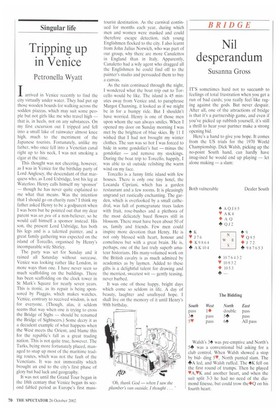Tripping up in Venice
Petronella Wyatt
Iarrived in Venice recently to find the city virtually under water. They had put up those wooden boards for walking across the sodden piazzas, which may suit some people but not girls like me who travel high — that is, in heels, not on any substances. On my first excursion out I tripped and fell into a small lake of rainwater almost knee high, much to the merriment of the Japanese tourists. Fortunately, unlike my father, who once fell into a Venetian canal right up to his neck, I was not smoking a cigar at the time.
This thought was not cheering, however, as I was in Venice for the birthday party of Lord Anglesey, the descendant of that marquess who, as Lord Uxbridge, lost his leg at Waterloo. Henry calls himself my 'sponsor' — though he has never quite explained to me what that means. Was the intention that I should go on charity runs? I think my father asked Henry to be a godparent when I was born but he pointed out that my dear parent was un peu of a non-believer, so he would call himself a sponsor instead. His son, the present Lord Uxbridge, has both his legs and is a talented painter, and a great family gathering was expected on the island of Torcello, organised by Henry's incomparable wife Shirley.
The party was set for Sunday and it rained all Saturday without surcease. Venice was looking rather like London, in more ways than one. I have never seen so much scaffolding on the buildings. There has been scaffolding on the clock tower in St Mark's Square for nearly seven years. This is ironic, as its repair is being sponsored by Piaggio, which makes watches. Venice, contrary to received wisdom, is not for everyone. (Though, alas, it seldom seems that way when one is trying to cross the Bridge of Sighs — should be renamed the Bridge of Sightseers.) Some decry it as a decadent example of what happens when the West meets the Orient, and blame this for the republic's fall as a great trading nation. This is not quite true, however. The Turks, being more fortunately placed, managed to snap up most of the maritime trading routes, which was not the fault of the Venetians. It was not immorality which brought an end to the city's first phase of glory but bad luck and geography.
It was not until the Grand Tour began in the 18th century that Venice began its second fabled period as Europe's first mass tourist destination. As the carnival continued for months each year, during which men and women were masked and could therefore escape detection, rich young Englishmen flocked to the city. I also learnt from John Julius Norwich, who was part of our group, why there are more Canalettos in England than in Italy. Apparently, Canaletto had a wily agent who dragged all the Englishmen he could find off to the painter's studio and persuaded them to buy a canvas.
As the rain continued through the night. I wondered what the boat trip out to Torcello would be like. The island is 45 minutes away from Venice and, to paraphrase Margot Channing, it looked as if we might be in for a bumpy ride. But I shouldn't have worried. Henry is one of those men upon whom the sun always smiles. When I opened my door on Sunday morning I was met by the brightest of blue skies. By 111 wished that I had not brought my winter clothes. The sun was so hot I was forced to hide in some gondolier's hut — minus the gondolier — and remove my stockings. During the boat trip to Torcello, happily, I was able to sit outside relishing the warm wind on my face.
Torcello is a funny little island with few houses. There is only one tiny hotel, the Locanda Cipriani, which has a garden restaurant and a few rooms. It is pleasingly ungrand yet rustically enchanting. The garden, which is overlooked by a small cathedral, was full of pomegranate trees laden with fruit, rose-bushes and a plethora of the most delicately hued flowers still in blossom. There must have been about 50 of us, family and friends. Few men could inspire more devotion than Henry. He is not only blessed with heart, honour and comeliness but with a great brain. He is, perhaps, one of the last truly superb amateur historians. His many-volumed work on the British cavalry is as much admired by academics as by laymen. Added to these gifts is a delightful talent for drawing and the merriest, sweetest wit — gently teasing, never barbed.
It was one of those happy, bright days which come so seldom in life. A day of beauty, laughter and unalloyed hope. I shall live on the memory of it until Henry's 90th birthday.


















































































 Previous page
Previous page